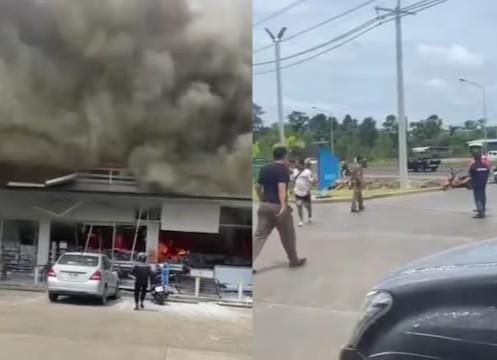
Hope Thailand & Cambodia will take measures for a cessation of hostilities: India
The ongoing border clashes between Thailand and Cambodia have sparked concerns globally, with India urging both nations to take measures to de-escalate the situation and prevent further escalation. The Ministry of External Affairs (MEA) spokesperson, Randhir Jaiswal, stated that India was “closely monitoring the situation” between the two countries and hoped that they would take steps to put an end to the hostilities.
The recent tensions between Thailand and Cambodia have been brewing for some time, with both countries having a long-standing dispute over the border territories. The situation escalated in recent weeks, with reports of gunfire and explosions near the shared border. The clashes have resulted in injuries and fatalities on both sides, causing widespread concern and disruption to the region.
India’s call for de-escalation is significant, given its close relations with both Thailand and Cambodia. The country has traditionally maintained friendly ties with both nations, and its involvement in the region is significant. India’s relationship with Thailand is built on shared economic interests, with the two countries having a trade agreement in place. Cambodia, too, has been a key partner for India in the Association of Southeast Asian Nations (ASEAN), with the two countries cooperating on various regional and international issues.
India’s stance on the border dispute is also reflective of its broader foreign policy objectives in the region. The country has been actively engaged in promoting regional cooperation and stability, and its involvement in the ASEAN Regional Forum (ARF) and the East Asia Summit (EAS) has been instrumental in shaping regional dynamics. India’s efforts to stabilize the region have also been driven by its concerns about the spread of extremism and terrorism, which has been a major focus of its foreign policy in recent years.
The Indian government’s desire to see an end to the hostilities between Thailand and Cambodia is also driven by its own economic interests. The region is a key trade partner for India, with both Thailand and Cambodia being major players in the Association of Southeast Asian Nations (ASEAN). The border dispute has disrupted trade and commerce in the region, causing significant economic losses for businesses and industries.
In addition to its economic interests, India’s involvement in the region is also driven by its desire to promote regional stability and security. The country has been actively engaged in promoting regional cooperation and dialogue, and its involvement in the ARF and EAS has been instrumental in shaping regional dynamics. India’s efforts to stabilize the region have also been driven by its concerns about the spread of extremism and terrorism, which has been a major focus of its foreign policy in recent years.
The Indian government’s call for de-escalation is also reflective of its commitment to promoting regional diplomacy and dialogue. The country has been actively engaged in promoting regional cooperation and dialogue, and its involvement in the ARF and EAS has been instrumental in shaping regional dynamics. India’s efforts to stabilize the region have also been driven by its concerns about the spread of extremism and terrorism, which has been a major focus of its foreign policy in recent years.
In conclusion, India’s call for de-escalation between Thailand and Cambodia is significant, given its close relations with both nations. The country’s involvement in the region is driven by its economic interests, security concerns, and commitment to promoting regional diplomacy and dialogue. India’s efforts to stabilize the region have also been driven by its concerns about the spread of extremism and terrorism, which has been a major focus of its foreign policy in recent years.
India’s stance on the border dispute is also reflective of its broader foreign policy objectives in the region. The country has been actively engaged in promoting regional cooperation and stability, and its involvement in the ASEAN Regional Forum (ARF) and the East Asia Summit (EAS) has been instrumental in shaping regional dynamics. India’s efforts to stabilize the region have also been driven by its concerns about the spread of extremism and terrorism, which has been a major focus of its foreign policy in recent years.
It is hoped that both Thailand and Cambodia will take heed of India’s call for de-escalation and work towards ending the hostilities. The region can ill-afford further instability and disruption, and it is essential that both countries prioritize dialogue and diplomacy to resolve their differences. India’s involvement in the region will continue to be crucial in promoting regional stability and security, and its efforts to de-escalate the situation will be closely watched by all parties involved.



